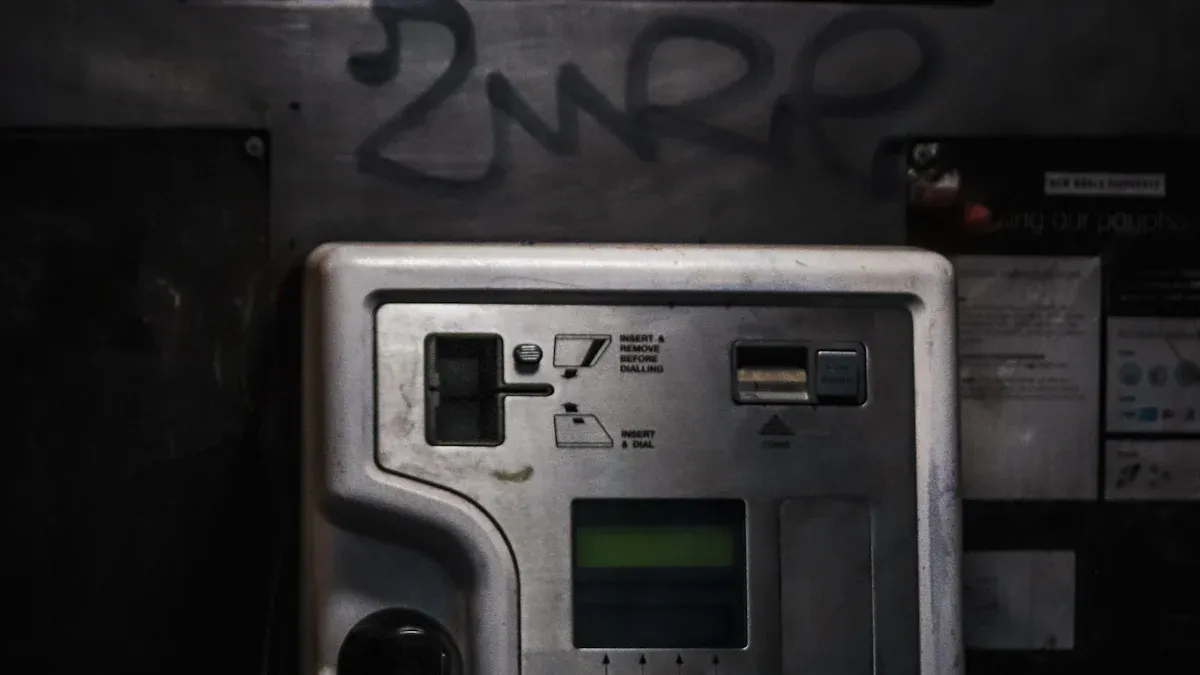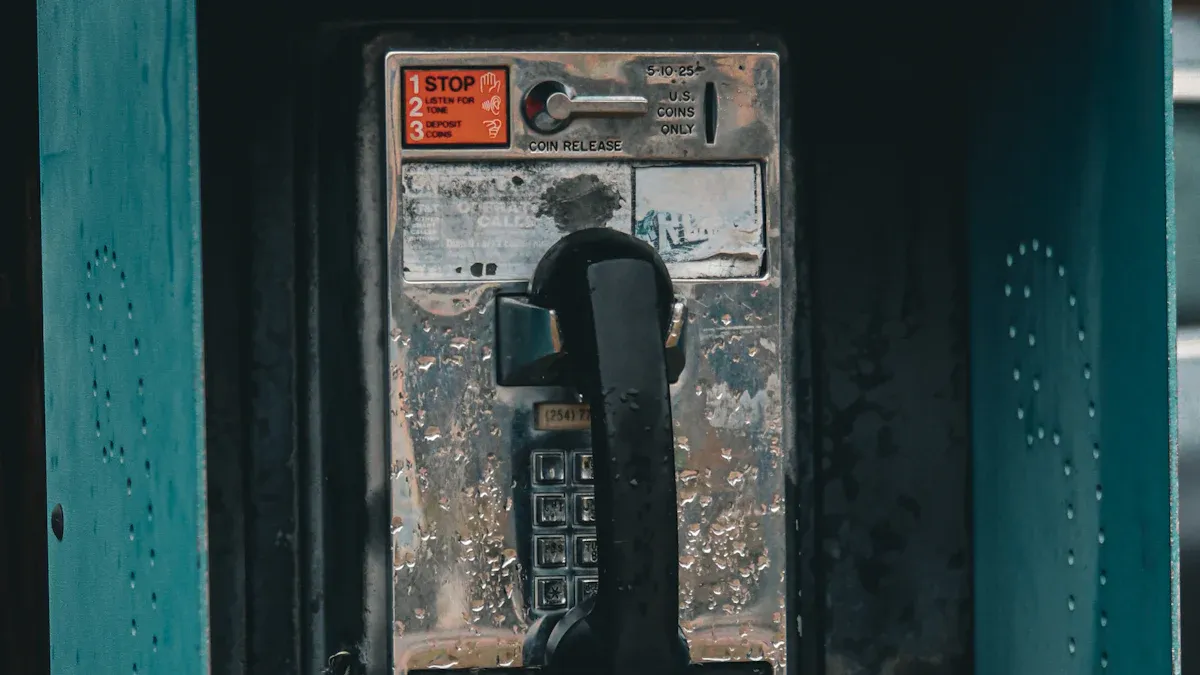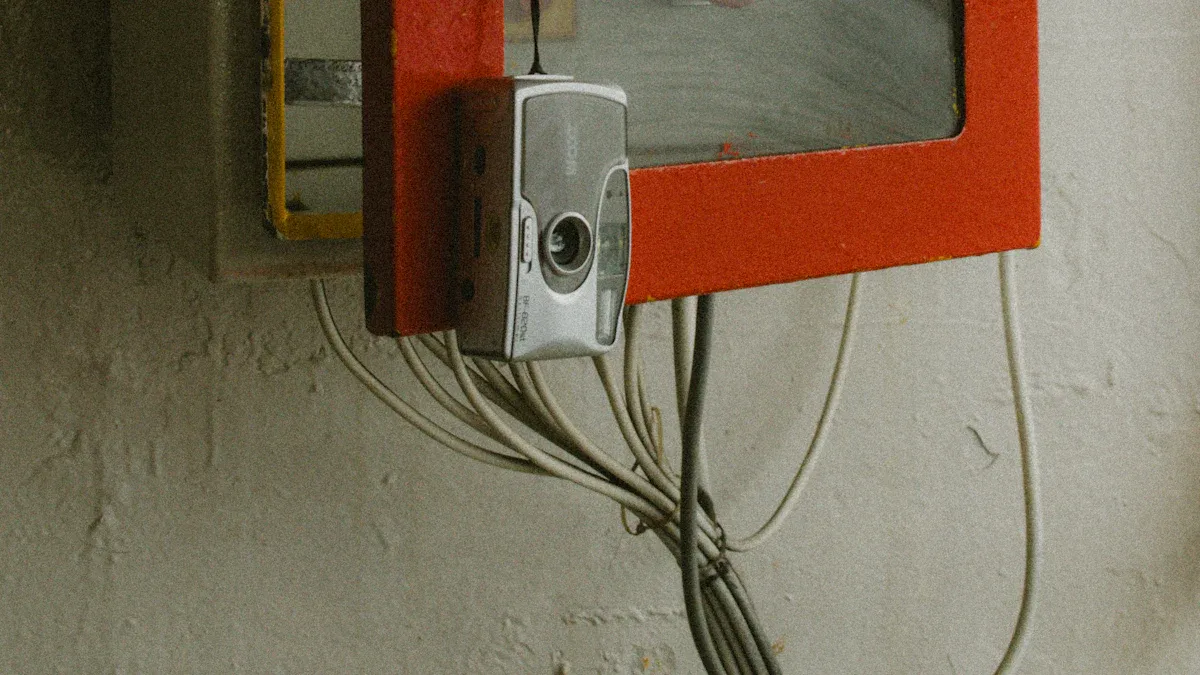
Industrial environments often face extreme conditions like heavy rain, dust, and noise. A rainproof weatherproof telephone ensures uninterrupted communication in such settings. Selecting a waterproof industrial telephone with robust features enhances safety and reliability. An IP weatherproof telephone or an analog weatherproof telephone can withstand harsh conditions, ensuring efficient operations and emergency readiness.
Why Weatherproof Telephones Are Essential for Industrial Use
Withstanding Harsh Environmental Conditions
Industrial environments often expose equipment to extreme conditions. Weatherproof telephones are built to endure these challenges. They resist acidic atmospheres, explosive gases, and fluctuating temperatures. These devices also function effectively in areas with loud ambient noise or heavy vibrations, such as power plants and factories. Their moisture-proof speakers and modular connections ensure consistent performance, even in outdoor settings. This durability makes them indispensable for maintaining communication in harsh environments.
Ensuring Safety and Emergency Communication
Reliable communication is critical during emergencies. Weatherproof telephones provide a dependable link in hazardous or remote locations. In industrial settings, they ensure clear audio transmission, even in noisy surroundings. Features like noise-canceling microphones and speed dial functionality enhance their usability during crises. These phones play a vital role in emergency response systems, helping workers report incidents quickly and receive timely assistance.
Meeting Industrial Standards and Regulations
Industries must comply with strict safety and operational standards. Weatherproof telephones meet these requirements by offering robust designs and advanced features. Their ability to withstand tough conditions aligns with regulatory demands for reliable communication tools. These devices also support various industrial applications, from manufacturing plants to transportation hubs. Their compliance with standards ensures they remain a trusted choice for businesses prioritizing safety and efficiency.
Top Features to Look For in a Rainproof Weatherproof Telephone

IP Ratings for Dust and Water Resistance
A rainproof weatherproof telephone must have a high IP rating to ensure protection against dust and water. The IP (Ingress Protection) rating indicates the level of resistance a device offers. For industrial environments, a minimum rating of IP65 is recommended. This ensures the telephone is dust-tight and can withstand water jets. Higher ratings, such as IP67, provide protection against temporary immersion in water. The table below explains the IP rating system:
| First Digit | Solid Protection* | Second Digit | Liquid Protection* |
|---|---|---|---|
| 5 | Dust cannot ingress | 5 | Protected against jetting water |
| 6 | Dust tight | 6 | Protected against powerful jetting water |
| 7 | N/A | 7 | Protected against immersion in water up to 1m |
Understanding these ratings helps industries select telephones that meet their specific environmental challenges.
Durable Materials and Corrosion Resistance
Rainproof weatherproof telephones must withstand harsh conditions. Materials like stainless steel or aluminum alloy resist corrosion caused by moisture, chemicals, or salt. These materials also enhance the device’s durability, ensuring long-term performance in outdoor or industrial settings. For example, telephones with 316 stainless steel faceplates are highly resistant to rust and physical damage, making them ideal for petrochemical plants and coastal areas.
Power Source Options (e.g., battery, wired)
Power flexibility is crucial for industrial telephones. Rainproof weatherproof telephones often offer multiple power options, such as battery-operated or wired connections. Battery-powered models work well in remote locations without access to electricity. Wired options, on the other hand, provide consistent power in facilities with stable electrical systems. Industries can choose the best option based on their infrastructure and operational needs.
Noise-Canceling Technology for Clear Audio
Industrial environments are often noisy. Telephones equipped with noise-canceling microphones ensure clear communication. This feature filters out background noise, allowing users to hear and be heard effectively. In emergency situations, this clarity can save lives by enabling accurate information exchange.
Easy Installation on Walls or Poles
Ease of installation is another critical feature. Rainproof weatherproof telephones should support mounting on walls or poles. This flexibility allows industries to place them in optimal locations for accessibility. Pre-drilled mounting holes and included hardware simplify the installation process, reducing setup time and effort.
Additional Functionalities (e.g., auto-dial, vandal resistance)
Modern rainproof weatherproof telephones offer advanced features like auto-dial and vandal resistance. Auto-dial allows users to quickly connect to pre-programmed numbers, which is essential during emergencies. Vandal-resistant designs, such as heavy-duty keypads and armored cables, protect the device from damage. The table below highlights some of these features:
| Feature | Description |
|---|---|
| Vandal Resistant Faceplate | 14 gauge 316 stainless steel with permanent laser etched graphics |
| Speed Dial | Programmable to speed dial up to 250 numbers |
| Armored Cable | 12″ cable with internal stainless steel lanyard |
| Security Screws | T-10 Security Torx drive mounting screws |
These functionalities enhance the reliability and usability of rainproof weatherproof telephones in demanding environments.
How to Evaluate and Choose the Right Model
Identifying Your Industrial Needs
Understanding the specific requirements of your industrial environment is the first step in selecting the right telephone. Consider factors like environmental conditions, noise levels, and the location of installation. For example, a rainproof weatherproof telephone is ideal for outdoor areas exposed to heavy rain or dust. In contrast, explosion-proof models suit hazardous zones like petrochemical plants. Identifying these needs ensures the chosen telephone meets operational demands effectively.
Comparing Models and Brands
Evaluating different models and brands helps in finding the most suitable option. Focus on features like IP protection, material durability, and power source compatibility. The table below highlights key criteria to consider:
| Feature | Description |
|---|---|
| IP Protection | Typically IP 66 with Gasket for weather resistance. |
| Material Durability | Constructed from light alloy for enhanced durability. |
| Power Source | Powered through the telephone network. |
| Cord Type | Usually a screened cable covered with stainless steel spiral cord. |
| Ringer Volume | Built-in ringer with volume exceeding 90 decibels for loud environments. |
| Additional Features | May include LED for better visibility and functionalities like speed dial. |
Comparing these features across brands ensures the selected model aligns with industrial needs while offering reliable performance.
Balancing Budget and Long-Term Value
Cost plays a significant role in decision-making, but long-term value should take precedence. A durable telephone with advanced features may have a higher upfront cost but reduces maintenance expenses over time. Investing in a high-quality rainproof weatherproof telephone ensures consistent performance, minimizing downtime and replacement costs. This approach balances budget constraints with operational efficiency.
Checking Warranties and Customer Support
Warranties and customer support reflect a brand’s confidence in its product. Look for models with comprehensive warranties covering manufacturing defects and environmental damage. Reliable customer support ensures timely assistance for installation, troubleshooting, or repairs. These factors enhance the overall user experience and provide peace of mind for industrial operators.
Common Applications of Weatherproof Telephones

Manufacturing and Processing Plants
Manufacturing and processing plants often operate in environments with high noise levels, dust, and vibrations. Weatherproof telephones provide reliable communication in these challenging conditions. Workers use them to coordinate tasks, report equipment malfunctions, or respond to emergencies. Their durable construction ensures they withstand exposure to chemicals, heat, and moisture. These telephones also support safety protocols by enabling quick communication during incidents.
Oil, Gas, and Petrochemical Facilities
Oil, gas, and petrochemical facilities require communication devices that can handle explosive atmospheres and corrosive substances. Weatherproof telephones with explosion-proof designs meet these demands. They allow workers to communicate effectively in hazardous zones. Features like noise-canceling microphones and corrosion-resistant materials enhance their performance. These telephones also integrate with emergency systems, ensuring rapid response during critical situations.
Construction and Mining Sites
Construction and mining sites present unique challenges, including dust, debris, and extreme weather. Weatherproof telephones ensure uninterrupted communication in these rugged environments. Workers rely on them to coordinate operations, report hazards, and maintain safety. Their robust design resists physical damage, making them ideal for outdoor and underground use. Easy installation on poles or walls ensures accessibility in remote locations.
Transportation Hubs and Tunnels
Transportation hubs and tunnels require reliable communication systems to manage operations and emergencies. Weatherproof telephones play a vital role in these settings. They enable staff to communicate across long distances and ensure passenger safety. In tunnels, these devices provide a lifeline for drivers and maintenance crews. Their ability to function in damp and noisy conditions makes them indispensable.
Municipal and Emergency SOS Systems
Municipalities use weatherproof telephones in public spaces for emergency SOS systems. These devices allow citizens to report accidents, crimes, or other emergencies. Their vandal-resistant design ensures durability in urban environments. Features like auto-dial to emergency services enhance their usability. Municipal authorities also deploy them in parks, bridges, and highways to improve public safety.
Selecting the right weatherproof telephone ensures safety and efficiency in industrial environments. Key features like high IP ratings, durable materials, and advanced functionalities should guide the decision.
Investing in a reliable model enhances long-term value by reducing maintenance costs and downtime. Tailoring the choice to specific needs guarantees optimal performance in harsh conditions.
FAQ
What does an IP rating mean for weatherproof telephones?
An IP rating measures a device’s resistance to dust and water. Higher ratings, like IP67, ensure better protection against harsh environmental conditions.
Can weatherproof telephones be used in explosive environments?
Yes, explosion-proof models are designed for hazardous areas. They meet safety standards and resist explosive gases, making them suitable for petrochemical and mining industries.
How do noise-canceling features improve communication?
Noise-canceling technology filters background sounds. This ensures clear audio transmission, even in loud industrial settings, enhancing communication efficiency and safety.


